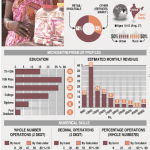What the ‘Varsity Blues’ Scandal Says (And Doesn’t Say) About Bill McGlashan, the Rise Fund and Impact Investing
News of Bill McGlashan’s downfall has sparked all kinds of commentary – and a fair amount of schadenfreude. After the founder and CEO of TPG’s multi-billion dollar Rise Fund was ensnared in the “Varsity Blues” college admissions scandal, charged in a fraudulent scheme to get his son into an elite university, he was swiftly put on indefinite leave from TPG, then resigned soon thereafter. In response, impact investing advocates have fretted about the fallout for the sector’s image, while skeptics (most notably social impact gadfly Anand Giridharadas) gleefully spiked the football.
I’ll be honest, I understand the impulse. I did not like the way TPG launched the Rise impact fund in 2016, led by McGlashan, U2’s Bono, Jeff Skoll and several other high-profile board members/investors. After I’d spent seven years in impact investing, Bono’s declaration that impact investing had become “a lot of bad deals done by good people” inspired deep personal resentment. I wasn’t the only one. Bono was trotted out to draw potential impact-focused limited partners (LPs) into the fund – serious investors who were mystified by the presence of a fading rock star with little knowledge of investing, impact or otherwise.
The exasperation grew as TPG organized a splashy press tour headlined by McGlashan – a businessman and investor who seemed to have earned his impact street cred on an expat package during a year in Mumbai. At the top of nearly every article about the new fund, a smiling McGlashan, often sporting Buddhist prayer beads or woven African bracelets, professed to be a private equity titan with a soul – and the media bought into the brand. The New York Times’ Andrew Ross Sorkin said McGlashan, “more resembles a Buddhist monk than a cigar-chomping banker in pinstripes.” Bloomberg highlighted his views on how to measure impact. Impact Alpha declared that “the era of impact washing is over,” based in part on the Rise Fund’s “impact multiple of money (IMM)” – an over-engineered assessment tool that glosses over the complexity of impact measurement, fails basic tests around intentionality and overstates the impact outcomes of investment dollars. It felt like McGlashan and his partners thought that us impact investing bumpkins could be fooled with well-placed souvenirs from travel in low-income countries and flashy annual meetings – and for a while, it seemed like they were right.
But now that McGlashan’s epic fall from grace undercuts the Rise narrative, both TPG and the broader sector should take note of a few things as we all move past this controversy. First, it’s important to look beyond superficial markers of virtue – whether we’re assessing the sector’s leaders or the impact of its investments. Large donations and a cushy year abroad don’t prove a commitment to leveling the playing field for low-income people or fighting climate change, not for Bill McGlashan nor when we hire interns at Blue Haven Initiative. And reducing impact assessment to a series of ratios and generous assumptions makes for better marketing material than proof of impact.
Impact investing is still harder than regular investing: It requires equal due diligence on financial return and commitment to impact. But Rise was backed by very few seasoned impact investors. Instead, the majority of the fund is made up of pension funds and large asset managers facing pressure from clients to include impact offerings. And with few options that can absorb $50 million+ investments, these large investors jumped at the first thing that smelled like impact, with little diligence beyond TPG’s existing non-impact reputation. TPG offered a convenient way for these gorilla LPs to tick the impact box. But investors who’ve long struggled to integrate impact into their capital allocation decisions weren’t fooled by the presence of Bono, or the mainstage monologues of an old white guy from a firm better known for investing in Petco and ruining J.Crew than building anything with a social good. And anyone experienced with impact measurement tools knows that none of them are perfect, but questioning intentionality remains a cornerstone of good impact due diligence.
Second, it’s essential to realize that no organization should ever be about one person. With 20 dedicated sector experts and investing professionals, McGlashan’s involvement in the Rise Fund’s day-to-day activities was mostly limited to a seat on the investment committee and occasional executive oversight. His ubiquity in the press overshadowed the TPG team doing the real work behind Rise. Many of these hired hands have lengthy histories considering both impact and financial returns, and deeply care about the work being done. They’ll continue to do that work, and maybe one or two of them will actually get to comment in public now that McGlashan is… busy. Rise has always had the potential to serve a bigger purpose: The traditional TPG growth equity team working on Rise’s deals may find themselves considering the environmental and social impact of non-Rise deals, as the firm refocuses and the current controversy dies down. If we can get more mainstream equity firms like TPG to infuse even a small amount of impact thinking into their due diligence processes, we have a shot at moving the capital markets needle in a positive direction.
Finally, I hope we can all agree that though impact investors spend their days considering how to make the world a better place, that doesn’t absolve any single person from following their moral compass. And conversely, one individual’s mistakes shouldn’t invalidate the work of an entire industry. Anand Giridharadas using one man’s ethical failings to grab the mic is characteristically self-serving, but as usual, he forgot that there might be a baby in the bath water. One morally bankrupt individual disingenuously leveraged an industry’s growing popularity for his own personal aggrandizement, then had his true moral nature exposed in the most public way possible. This does not mean impact investing is any less worthy an effort. On the contrary, it reveals an even greater need for the kind of societal change that impact investing hopes to accelerate.
It also highlights an even simpler truth: If you’re an impact investor, or a regular investor, or a worker in any industry, at any level … try not to be evil. Someone always finds out.
Lauren Cochran is Managing Director at Blue Haven Initiative.
Photo courtesy of Web Summit.
- Categories
- Impact Assessment, Investing



